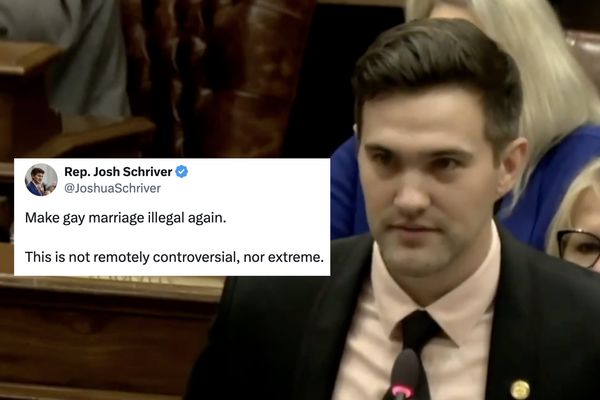
Philip Staindl: Look, it’s still going to be a negative, because [the journalist] is out to get you and he hates lobbyists like me and the imputation he is trying to create is that by me organising a function where you’re invited and it’s on behalf of, the function is to raise funds for the South East MPs, that is giving you undue access and influence to them.
John Woodman: Yeah, which is exactly right.
It was November 2018, and The Age had just published details of Victorian developer John Woodman — the figure at the centre of the Independent Broad-based Anti-Corruption Commission’s (IBAC) report into the rotten Casey local council — and his efforts to secure planning approval for several projects.
Woodman had donated thousands of dollars to Labor MPs, including via a fundraiser in 2014. The Age article said the fundraiser was arranged by long-time Labor-connected lobbyist Philip Staindl, who was working for Woodman. Staindl was boasting to Woodman on the phone that he was happy to let the media think that, when in fact it was Woodman’s company that had arranged the fundraiser, just as Woodman had arranged fundraisers for Liberal and Labor state MPs and local councillors.
According to IBAC’s report, between 2010 and 2019 Woodman “made more than 180 transactions totalling $969,968 to the two major parties: $530,700 to the Liberal Party and $439,268 to the Labor Party”. According to IBAC:
Mr Woodman sought to achieve planning outcomes that were favourable to his own and his clients’ interests at state and local government levels by … lobbying and engaging registered lobbyists to assist in buying access to, and influence with, state and local government politicians, executives, political staff and political candidates … donating to fundraising entities to cultivate influence, including through donations, membership fees and tickets to attend fundraising events.
The report outlines in forensic detail how Woodman used the Labor and Liberal fundraising entities, Progressive Business (now Energise Victoria) and Enterprise Victoria respectively, to buy access to MPs and ministers, right up to Premier Daniel Andrews, who met with Staindl (in a disputed discussion in relation to which IBAC preferred the evidence of the lobbyist).
In 2018, Andrews introduced caps on political donations, effectively killing the business model of state-level donations generated by fundraising entities like the ones Woodman exploited.
But the story doesn’t end there. When state-level donation caps were introduced, Labor’s fundraising vehicle — which Staindl had previously led — simply switched to sending funds it raised to federal Labor, to which much looser Commonwealth donations laws applied. Money is fungible, and party branches can move money between each other with far less scrutiny than political donations. Woodman continued to be offered access and influence.
The insight afforded by IBAC into the behaviour of Progressive Business and Enterprise Victoria gives us a clear picture of how a two-speed democracy worked in Victoria, and still works now at the federal level.
“Mr Woodman saw a clear link between his investments in candidates and the promotion of his development interests,” IBAC found. Before the 2018 election, Woodman told Staindl: “The internal word coming out of the government departments is that [the C219] amendment will not get approved … Let’s organise a fundraiser for Pauline [Richards] the new Cranbourne candidate ASAP. Let’s do the fundraiser under your banner so my name is not dragged into it; we will raise $20,000 with a boardroom lunch.” (The fundraiser was never organised, but Woodman donated $20,000 to Richards).
In early 2016, Woodman’s consultant and lobbying arms, Watsons and Schutz Consulting, were offered an “important partnership” by Progressive Business, with lead lobbyist Megan Schutz later telling IBAC: “We got preferential treatment in terms of meetings … I thought it was because Watsons was a platinum member of Progressive Business.” IBAC noted: “The fact that the premier, in his evidence, agreed that his awareness of Ms Schutz was entirely a result of these functions, supports the proposition that these events serve to raise the profile of attendees with senior MPs.”
Enterprise Victoria, representing a party out of power, was if anything even more eager to cultivate Woodman. In an intercepted phone call in early 2019, then-executive director of Enterprise Victoria Amy Sullivan asked Woodman: “Would there be any value in me organising a meeting with you and [Michael O’Brien] and [Robert Clark] in their new positions as state president and opposition leader [sic]? Would that be of value to you in the next few weeks or are you all right?”
Woodman also, with the cooperation of both the Labor and Liberal fundraising entities, split his donations up so as to avoid Commonwealth reporting obligations — using John Howard’s dramatic increase in the federal political donation reporting threshold in 2005 to avoid reporting them to the Australian Electoral Commission. This continued even after the 2018 Victorian donation law changes.
IBAC:
For Mr Woodman’s 2019 ‘leadership package’ with Enterprise Victoria, a $70,000 contribution was paid in seven $10,000 instalments via a number of companies, with the details of this arrangement provided to Enterprise Victoria. Similarly, Mr Woodman split the payment for his 2018-19 ‘platinum package’ membership with Progressive Business into five $10,000 payments from five companies …
When asked about Mr Woodman’s practice of splitting invoices, the then-executive director of Enterprise Victoria initially denied that this was done to avoid the federal donation threshold. However, they later confirmed that ‘if somebody decided to split the lump sum into different entities, they wouldn’t be disclosed [because] if $50,000 was split across five invoices, each individual invoice would be less than the [federal] disclosure amount’.
In 2019, Woodman’s PA explicitly told an unidentified federal MP that she needed the donation invoices to be reissued so that a contribution of $15,000 could be split up to avoid reporting requirements. The threshold (currently more than $16,000) applies to donors and political parties, although Labor and most political parties, but not the Liberals or the Nationals, report all contributions over $1000.
While these practices are well known, this is the first time the extent to which donors, political party fundraising arms and politicians conspire to keep the purchasing of access and influence secret has been mapped out so clearly. And at the federal level, none of it is illegal. The Commonwealth has laws that directly enable a two-speed democracy in which the Woodmans of the world buy opportunities to directly influence decision-makers, while the rest of us can only look on and write to our MPs.







